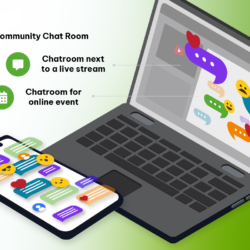B2B marketing has undergone a significant transformation in recent years. Decision-makers now have access to vast amounts of information, research multiple vendors, and interact with brands across diverse digital and offline channels. To effectively capture attention and convert prospects, Omnichannel Marketing has emerged as an essential strategy. By integrating all marketing channels into a seamless, consistent experience, B2B companies can build trust, improve engagement, and accelerate business growth.
The Concept and Importance of Omnichannel Marketing
Omnichannel Marketing differs from traditional multi-channel approaches in that it emphasizes integration and cohesion across all platforms. While multi-channel marketing focuses on being present in multiple channels, omnichannel strategies unify messaging, branding, and customer experience across all touchpoints. Prospects engaging with a company through email, social media, webinars, events, or digital ads receive a connected experience that reinforces credibility and demonstrates professionalism. This approach reduces friction in the buying process and strengthens brand recognition and loyalty.
Mapping the B2B Buyer Journey
The B2B buyer journey is inherently complex, involving multiple stakeholders and longer decision-making cycles. Prospects may start their journey with research, move on to consuming thought leadership content, attend webinars, and then evaluate solutions before initiating a conversation with sales. Omnichannel Marketing ensures that each interaction aligns with the overall narrative, guiding buyers through awareness, consideration, and decision stages. For example, a prospect reading an industry blog can receive targeted follow-up emails, content suggestions, or webinar invitations that maintain engagement and nurture the lead effectively.
Data-Driven Personalization for Higher Engagement
Data is at the heart of Omnichannel Marketing. Insights from CRM systems, marketing automation platforms, web analytics, and social engagement provide a comprehensive understanding of prospect behavior. This enables hyper-personalization, allowing marketers to deliver content and messaging tailored to the buyer’s interests and stage in the journey. For instance, if a prospect downloads a case study, automation tools can trigger personalized follow-ups, product demonstrations, or invitations to relevant events. Data-driven personalization builds trust, enhances engagement, and accelerates conversion rates.
Maintaining Consistency Across Channels
Consistency is essential in establishing credibility in B2B markets. Omnichannel Marketing ensures that all touchpoints—from social media posts and email campaigns to webinars and paid advertisements—reflect the same messaging, tone, and visual identity. Consistent communication reinforces the brand’s reliability and strengthens recall, ensuring that buyers remember the brand positively when making purchasing decisions. Uniform messaging across channels also enhances trust and demonstrates professionalism, key factors in influencing B2B purchasing decisions.
Coordinated Multi-Channel Engagement
Omnichannel Marketing enables brands to coordinate engagement across multiple channels effectively. Each interaction builds on the previous touchpoint, creating a connected experience that nurtures prospects and drives them toward conversion. For example, a LinkedIn interaction might trigger a follow-up email with additional insights and an invitation to a webinar. Coordinated campaigns maintain attention, provide relevant content, and deliver seamless experiences, ensuring that buyers are guided effectively through the decision-making process.
Aligning Sales and Marketing for Greater Effectiveness
Omnichannel Marketing bridges the traditional gap between marketing and sales by enabling data sharing, collaborative workflows, and integrated lead scoring. Marketing teams nurture prospects with personalized content, while sales teams use these insights to conduct informed conversations. This alignment ensures that leads are engaged with the right message at the right time, improving conversion rates, shortening sales cycles, and maximizing overall revenue potential. Collaboration between marketing and sales is essential in B2B contexts, where purchase decisions often involve multiple stakeholders and longer evaluation periods.
Technology as an Enabler
Technology is a critical enabler for Omnichannel Marketing, providing the tools needed to deliver personalized, timely, and consistent engagement at scale. Marketing automation platforms, AI-driven analytics, and predictive modeling enable businesses to track interactions, predict behavior, and optimize campaigns in real-time. Automation ensures that follow-ups occur promptly, while AI identifies high-value prospects and recommends personalized content. Integrated platforms provide a unified view of the buyer journey, enabling marketers to make informed decisions and enhance campaign effectiveness.
Measuring Omnichannel Success
Monitoring performance across all channels is essential to evaluate the effectiveness of Omnichannel Marketing. Key metrics include lead quality, engagement rates, conversion rates, customer acquisition cost, and lifetime value. Cross-channel analytics and attribution modeling help identify which touchpoints drive conversions and inform optimization strategies. Continuous measurement allows marketers to refine campaigns, allocate resources efficiently, and maximize ROI. A well-measured omnichannel strategy ensures that every touchpoint contributes meaningfully to overall growth objectives.
Driving Long-Term Customer Relationships
Omnichannel Marketing not only accelerates acquisition but also strengthens long-term customer relationships. Continuous engagement through personalized emails, account-based campaigns, webinars, and content updates ensures that clients feel supported and informed. This ongoing communication encourages renewals, cross-sells, upsells, and referrals. Customers who consistently receive value and experience seamless engagement are more likely to become brand advocates, amplifying the company’s reputation and reach. Omnichannel Marketing builds loyalty, trust, and sustainable growth.
Preparing for the Future of B2B Marketing
The future of B2B marketing relies on intelligent, responsive, and integrated Omnichannel Marketing strategies. Advances in AI, machine learning, and predictive analytics will enable companies to anticipate buyer needs, deliver highly relevant content, and optimize engagement in real-time. Integrated platforms will provide a unified view of the customer journey, ensuring that every touchpoint is coordinated and personalized. Businesses that adopt these innovations will gain a competitive edge, offering buyer experiences that are seamless, intelligent, and human-centric. Omnichannel Marketing will continue to serve as a strategic driver of growth, engagement, and long-term success in B2B markets.
About Us
Acceligize is a global B2B demand-generation and technology marketing firm specializing in performance-driven lead generation solutions. Their services include content syndication, account-based marketing, intent and install-based targeting, and custom campaign strategies. Leveraging data science, technology, and human intelligence, Acceligize helps clients reach high-quality audiences and drive conversions across the full marketing funnel.

